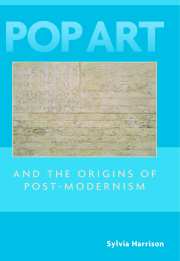Book contents
- Frontmatter
- Contents
- Introduction
- PART ONE THEORETICAL FRAMEWORK
- PART TWO “SOCIAL” CRITICS
- PART THREE “PHILOSOPHICAL” CRITICS
- 5 Barbara Rose: Pop, Pragmastism, and “Prophetic Pragmatism”
- 6 Max Kozloff: A Phenomenological Solution to “Warholism” and Its Disenfranchisement of the Critic's Interpretive and Evaluative Roles
- PART FOUR “CULTURAL” CRITICS
- Conclusion
- Notes
- Index
6 - Max Kozloff: A Phenomenological Solution to “Warholism” and Its Disenfranchisement of the Critic's Interpretive and Evaluative Roles
from PART THREE - “PHILOSOPHICAL” CRITICS
Published online by Cambridge University Press: 23 July 2009
- Frontmatter
- Contents
- Introduction
- PART ONE THEORETICAL FRAMEWORK
- PART TWO “SOCIAL” CRITICS
- PART THREE “PHILOSOPHICAL” CRITICS
- 5 Barbara Rose: Pop, Pragmastism, and “Prophetic Pragmatism”
- 6 Max Kozloff: A Phenomenological Solution to “Warholism” and Its Disenfranchisement of the Critic's Interpretive and Evaluative Roles
- PART FOUR “CULTURAL” CRITICS
- Conclusion
- Notes
- Index
Summary
Max Kozloff was born in Chicago in 1933. In 1953 he graduated in Arts from the University of Chicago and five years later was awarded an M.A. by the same institution. Subsequent study, though not completed, brought him to New York where he enrolled at the Institute of Fine Arts. After receiving a Fulbright Scholarsip in 1962, the year following Rose's receipt of the same award, Kozloff spent a year in France. By this time he had already commenced his career as a critic – primarily of American art – for which he would soon receive numerous awards, including a Pulitzer Fellowship for Critical Writing in 1962–3, the Frank Jewett Mather Award for Art Criticism in 1966 and a Guggenheim Fellowship 1968–9. Renderings, an anthology of criticism from this period, was published in 1968. In the next decade Kozloff took on the further role of photographer and broadened his critical and writing focus to encompass photography. One-man exhibitions of his photographs were held at the Holly Solomon Gallery, New York, in 1977, 1979, and 1980, and a further one at the Marlborough Gallery, New York, in 1982. In 1979 he published Photography and Fascination, followed by The Privileged Eye in 1987. During the sixties, Kozloff's prime critical platform was The Nation where he held the position of art critic, 1961–9. Further critical posts occupied during this period were those of New York correspondent, Art International, 1962–4, and contributing editor, Artforum, 1963–74.
- Type
- Chapter
- Information
- Pop Art and the Origins of Post-Modernism , pp. 146 - 168Publisher: Cambridge University PressPrint publication year: 2001



